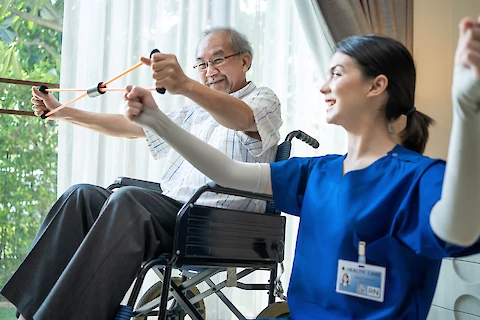
The neurological condition known as Parkinson's disease affects millions of people worldwide, with symptoms such as tremors, muscle stiffness, and difficulty with balance and coordination. As these symptoms progress, daily activities can become increasingly challenging.
One essential aspect of managing Parkinson's disease is to maintain an active lifestyle and seek proper care. Enter the world of physical therapy! The significant role that physical therapy plays in Parkinson's disease management helps individuals maintain mobility, reduce stiffness, and improve overall quality of life. Let's dive in and discover how this proactive approach can help individuals with Parkinson’s lead a healthier and happier life.
Benefits of Physical Therapy for Parkinson's Disease
Physical therapy offers various benefits for individuals with Parkinson's disease. Some of the most notable advantages include:
- Improved mobility and balance: Physical therapy focuses on exercises that enhance balance, coordination, and gait, helping you move more confidently and safely.
- Reduced stiffness and rigidity: Targeted stretching and range of motion exercises can alleviate muscle stiffness and increase flexibility, making daily activities more manageable.
- Increased strength and endurance: Strength training is vital in maintaining muscle mass, which leads to better overall function and endurance.
- Enhanced overall quality of life: By addressing the physical challenges of Parkinson's disease, you can experience increased independence and an improved sense of well-being.
Components of a Parkinson's Disease Physical Therapy Program
A comprehensive physical therapy program for Parkinson's disease may include:
Regular Exercise
- Aerobic activities: Incorporate activities like walking, swimming, or cycling to improve cardiovascular health and stamina.
- Strength training: Use resistance exercises to maintain muscle strength and prevent muscle wasting.
- Flexibility exercises: Maintain range of motion and reduce stiffness with yoga, tai chi, or other stretching routines.
Stretching
Stretching can alleviate muscle stiffness, improve posture, and increase overall flexibility. Work with your physical therapist to develop a stretching routine that targets affected muscles and joints.
Gentle Activity
Engaging in mild physical activities like gardening, leisurely walks, or dancing can provide exercise benefits without causing excessive fatigue. Tai chi, yoga, and water aerobics are also low-impact exercise options suitable for individuals with Parkinson's disease.
Tips for Finding a Good Physical Therapist
When searching for a skilled physical therapist to help manage Parkinson's disease, consider the following tips:
- Ask for recommendations from healthcare providers, such as your primary care physician or neurologist.
- Look for a therapist who has experience treating Parkinson's disease and is familiar with its unique challenges.
- Ensure the therapist is a good fit for your needs and preferences by scheduling a consultation to discuss your goals and concerns.
- Verify the therapist's credentials and certifications to ensure they have the necessary expertise to treat your condition effectively.
Tailoring a Treatment Plan to Meet Individual Needs
A personalized treatment plan is essential in addressing the unique symptoms and challenges of each individual with Parkinson's disease. Factors to consider when creating a treatment plan include the person's age, their stage of the disease, and overall health and fitness levels. Regularly reassessing and adjusting the treatment plan is crucial to ensure the best possible outcome.
Being Proactive About Parkinson's Disease Management
Taking a proactive approach to Parkinson's disease management can significantly impact your quality of life. Receiving early intervention is crucial, along with being closely monitored and in communication with your healthcare team to record changes in symptoms.
Work with Senior Helpers Folsom-Granite Bay
Physical therapy plays a vital role in managing the symptoms and effects of Parkinson's disease. By seeking the guidance of a skilled physical therapist and working together to create a tailored treatment plan, you can maintain mobility, reduce stiffness, and improve your overall quality of life.
If you are in Rocklin, Loomis, Folsom, Orangevale, Granite Bay, or Penryn and have been diagnosed with Parkinson's disease, contact Senior Helpers Folsom-Granite Bay today to learn more about how our services can help improve your quality of life.